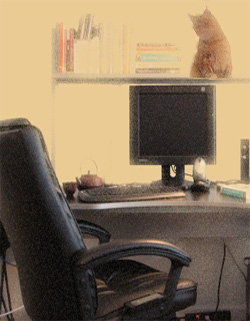From the Editor’s Desk
Kate Bernadette Benedict
Poetry and the Working Life
Back in the day, I was, for a time, a college drop out. Instead of classes and cramming and writing papers, garbed in bell bottoms and Indian cottons, I sat at a front desk, in pert dresses, receiving and testing applicants at a publisher of encyclopedias. It was the first of a string of office jobs over the next 2½ years, secretarial jobs in the areas of book publishing and ecumenical church media. But I was a poet then too, and a poetry adorer. The first thing I’d do in any new job was type up some of my favorite poems—most were by Hopkins—and affix them to the wall above my desk. That was the first time I began to wonder why poems didn’t reflect this new world I was working in, the world of work which only the richest of fat princes do not participate in.
Certainly the so-called “canonical” poems did not reflect working life, the poems I’d been studying in school, the few exceptions being farming poems by Robert Frost. The contemporary poets I was reading passionately then (Richard Wilbur, Anne Sexton) did not concern themselves with the workaday either. This “disconnect” was a fleeting concern, though—I got caught up in a whirlwind of new experience and late adolesecent turmoil—but a few years later, after earning a degree and finding myself back behind the desks of business offices, it became a burning issue. I looked around those bustling office spaces and saw untapped possibilities for poetry everywhere I looked. In the world of work, all the human passions are on display. People suffer and triumph or just slog through. There is birth, death, illness. There are objects around of totemic significance and in the air a scary whiff of insignificance, an existential absurdity. Office work became my subject matter for a long time.
Eventually, some influential poets and editors saw the value of compiling poems that grow out of the world of work. A number of anthologies were the result: Going for Coffee (1981) and Paperwork (1991), edited by the Canadian poet Tom Wayman, himself a prime “work poet”; The Literature of Work (1991) from the University of Phoenix Press, a gorgeous volume; For A Living (1995) from the University of Illinois Press, perhaps the finest of the bunch in terms of quality poetry. Umbrella contributes to this tradition in this edition’s “extra”: To Make a Living.
When I put out the call for this special project, I never expected to receive so many submissions. Poets are sometimes thought of as rarefied creatures fit only for academia’s ivory tower or “lazybones” bohemia. But poets need paychecks too. Over the course of our lives we earn our salaries doing all sorts of work, or we do unsalaried housework, and we set our poet’s minds on that work and make art of it.
To write poetry is to tap into the collective unconscious, the great mysterium, but a poet also needs to get real. There is no realer place than the world of work, be it a corporate office, a factory, a hospital, a hotel, a restaurant, a movie house, a taxi cab, a mortuary, a jeweler’s, the Peace Corps; be it yardwork, gardening, farming, housework, mothering, teaching; be it work at an information desk, a draughtswoman’s desk, a writer’s desk: the very situations these poems explore.
(Should a reader be interested in my own “work poems,” some will be online in the Fall 2007 issue of Mannequin Envy; a selection will be featured on my site, as poems of the month for September, October and November 2007.)
Poetry in the Main
This issue’s regular poetry section is especially strong and delightfully eclectic. There are flawlessly executed formal poems (sapphics, quatrains, a pantoum), some rip-roaring examples of free verse, philosphical lyrics, ekphrastics, persona poems. We’re delighted to be featuring the work of older, more established poets and also some younger poets at the the threshold of their careers: Janna Layton, Aditi Machado, and Anne-Marie Rooney.
Once again, I’ve had some fun by composing a cento, using one line from each of the featured poems. How strange it is to do this and come up with something that makes a sort of weird sense! (Is there anyone else out there who feels that certain famous poets win prizes with poems that read just like centos?)
A Little Cento for Fall 2007
The woods were not quite yellow; Black Eyed Susans
lining the edge of a tilled field outside Decatur,
sweeter than urine,
stand there still. O vegetable love. Grow taller.
Behind them is a weathered shed,
the wind, the fields, the fat white sow.
This could be a heaven.
The moments aloft are less and less.
Still, though, we keep climbing,
flightless, silvery,
like slime beneath a snail.
If form takes content out in the first
long dispensation
as my parents might have, maybe,
Poet, you know the answer.
When desiging a writing program for children there are going to be differences in the curriculum but in all cases it's a good idea to try and foster a sense of joy in writing. While making a good writing lesson plan may help to teach the subject, often the best writing teachers are writers themselves.
Call for Submissions
Winter 2007 (online December 1) will be Umbrella's first anniversary issue!
Poems on general topics are welcome, and also poems for a planned special section on cold poems, i.e. poems which makes use of winter ideas and/or wintery imagery. Snow, sleet, ice, icicles, glaciers, Norway, whatever calls forth the inner and outer experience of a winter state. For this and all Umbrella extras, poems that have been published in books are welcome. If all goes well, more surprises will be in store for the anniversary edition.
We are reading prose as well.
Bumbershoot lives on but as an annual. The next planned issue of the ’shoot will be Summer 2008 and we will begin reading for it next year.
Nominations for The Best of the Net
The following are Umbrella’s nominations for the Best of the Net online anthology. Choosing them was an agony; in my opinion everything published in Umbrella is ipso facto “the best of the net.” But choices had to be made and here are the worthy poems selected, two from each issue of Umbrella published between December and June:
Ragbag by Catherine Chandler
Gold Street Bakery by Jehanne Dubrow
Pocket Comb by Paul Hostovsky
Dogs by Patty Paine
Anthropic Principle by Henry Quince
Hello Halo by James R.Whitley
A Loss
I lost a dear friend and mentor this summer, Jack Purdy, who died suddenly after suffering a stroke at the age of 82. Jack was a Presbyterian minister and the author of several nonfiction books published by Westminster Press; he was a columnist for Presbyterian Outlook magazine. He was also my boss for a couple of years back in the 1970’s when he was Director of Church Education and I was his secretary. We worked on Riverside Drive in a squat stone building irreverently called The God Box, since many church organizations set up shop there, including the National Council of Churches. I fondly remember our heart-to-heart conversations in his office overlooking the Hudson River. We stayed in touch over the years and were dedicated pen pals (viz. Impossible Epistles, an on-again, off-again feature on my site). Jack and his family contributed some fetching limericks to Bumbershoot last spring. He is featured on the dedication page of my book Here from Away and inspired one of its sonnets, A Score for Reverend Jack. A keen loss. If you like to contribute to Habitat for Humanity, may I suggest that you do so in his name to the Santa Fe branch where he did volunteer work.
of several nonfiction books published by Westminster Press; he was a columnist for Presbyterian Outlook magazine. He was also my boss for a couple of years back in the 1970’s when he was Director of Church Education and I was his secretary. We worked on Riverside Drive in a squat stone building irreverently called The God Box, since many church organizations set up shop there, including the National Council of Churches. I fondly remember our heart-to-heart conversations in his office overlooking the Hudson River. We stayed in touch over the years and were dedicated pen pals (viz. Impossible Epistles, an on-again, off-again feature on my site). Jack and his family contributed some fetching limericks to Bumbershoot last spring. He is featured on the dedication page of my book Here from Away and inspired one of its sonnets, A Score for Reverend Jack. A keen loss. If you like to contribute to Habitat for Humanity, may I suggest that you do so in his name to the Santa Fe branch where he did volunteer work.
--Back to Main Page--
